

Tim Urban: Inside the mind of a master procrastinator. Oren Yakobovich: Hidden cameras that film injustice in the world’s most dangerous places. Why I’m teaching prisoners to code. Six years ago, I entered San Quentin State Prison for the first time.
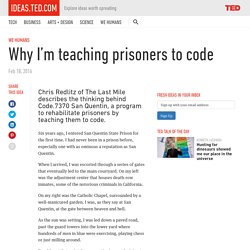
I had never been in a prison before, especially one with as ominous a reputation as San Quentin. When I arrived, I was escorted through a series of gates that eventually led to the main courtyard. On my left was the adjustment center that houses death-row inmates, some of the notorious criminals in California. On my right was the Catholic Chapel, surrounded by a well-manicured garden. I was, as they say at San Quentin, at the gate between heaven and hell. As the sun was setting, I was led down a paved road, past the guard towers into the lower yard where hundreds of men in blue were exercising, playing chess or just milling around. Frankly, at that point, I was questioning my decision to come there. Linda Liukas: A delightful way to teach kids about computers.
How To Change Your Life (TEDxTC) - Joe Martino. Eye phone: How a TED Fellow’s app could help restore sight to millions. Andrew Bastawrous shares the idea behind Peek at TED2014.
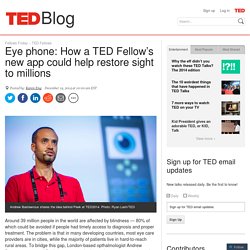
Photo: Ryan Lash/TED Around 39 million people in the world are affected by blindness — 80% of which could be avoided if people had timely access to diagnosis and proper treatment. The problem is that in many developing countries, most eye care providers are in cities, while the majority of patients live in hard-to-reach rural areas. To bridge this gap, London-based opthalmologist Andrew Bastawrous created Peek — an app and adapter that turn a smartphone into a comprehensive, easy-to-use, accurate eye-exam tool. Peek makes eye tests affordable and easy to administer, bypassing the need for expensive, fragile equipment. Lisa Kristine: Photos that bear witness to modern slavery. Helen Fisher: The brain in love. How big is the ocean? - Scott Gass. TEDxPresidio - Julie Hanna - Bringing humanity to business, and business to humanity. Alex Wissner-Gross: A new equation for intelligence. Announcing our TED Prize 2015 winner: Dave Isay of StoryCorps. Dave Isay of StoryCorps is the winner of the 2015 TED Prize.
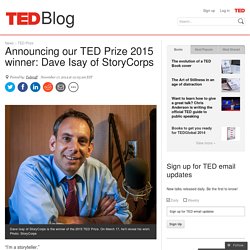
On March 17, he’ll reveal his wish. Photo: StoryCorps “I’m a storyteller.” It’s a sentence that can be found in a wide variety of TED Talks — because, really, it is the heart of what we do. This is why, for the 10th anniversary of the TED Prize in 2015, we are thrilled to award the million-dollar prize to Dave Isay, the founder of StoryCorps. But interestingly, while “story” is in the name, Isay sees StoryCorps as primarily about listening. On March 17, at the TED2015 conference, Isay will share an audacious wish for StoryCorps in a TED Talk. David McCandless: The beauty of data visualization. Art ... from data. The Most Astounding Fact - Neil deGrasse Tyson. Death and the missing piece of medical school. I learned about a lot of things in medical school, but mortality wasn’t one of them.
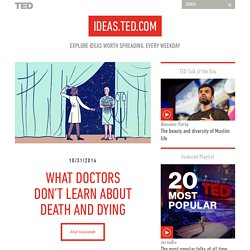
I was given a dry, leathery corpse to dissect in my first term — but that was solely a way to learn about human anatomy. Our textbooks had almost nothing on aging or frailty or dying. How the process unfolds, how people experience the end of their lives and how it affects those around them? That all seemed beside the point. The way we saw it — and the way our professors saw it — the purpose of medical schooling was to teach us how to save lives, not how to tend to their demise.
Frans de Waal: Moral behavior in animals. 10 places where anyone can learn to code. Teens, tweens and kids are often referred to as “digital natives.”
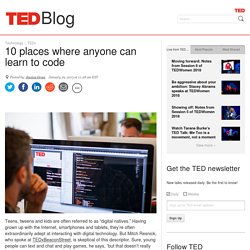
Having grown up with the Internet, smartphones and tablets, they’re often extraordinarily adept at interacting with digital technology. But Mitch Resnick, who spoke at TEDxBeaconStreet, is skeptical of this descriptor. Sure, young people can text and chat and play games, he says, “but that doesn’t really make you fluent.” Mitch Resnick: Let's teach kids to code Fluency, Resnick proposes in this TED Talk, comes not through interacting with new technologies, but through creating them. The former is like reading, while the latter is like writing. The point isn’t to create a generation of programmers, Resnick argues. In his talk, Resnick describes Scratch, the programming software that he and a research group at MIT Media Lab developed to allow people to easily create and share their own interactive games and animations.
Candy Chang: Before I die I want to... How should we talk about mental health? Mental health suffers from a major image problem.
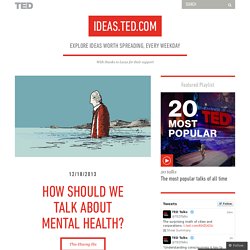
One in every four people experiences mental health issues — yet more than 40 percent of countries worldwide have no mental health policy. Across the board it seems like we have no idea how to talk about it respectfully and responsibly. Stigma and discrimination are the two biggest obstacles to a productive public dialogue about mental health; indeed, the problem seems to be largely one of communication. How to trust intelligently. “The aim [in society] is to have more trust.
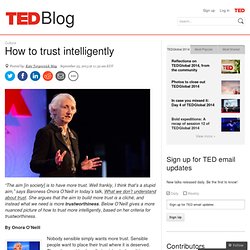
Well frankly, I think that’s a stupid aim,” says Baroness Onora O’Neill in today’s talk, What we don’t understand about trust. She argues that the aim to build more trust is a cliché, and instead what we need is more trustworthiness. Faire confiance a priori: Frédéric Lippi à TEDxLaRochelle. The unexpected math behind Van Gogh's "Starry Night" - Natalya St. Clair. A few lesson plans exist for teaching visual arts and self-similarity (objects that have the same pattern) that could be used after showing this lesson.
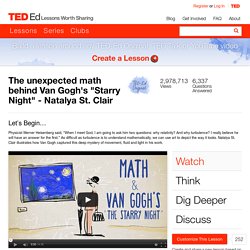
Shodor has some free lesson plans for students in grades 4 through 8. High school students can learn recursion algorithms to create the Koch curve using Scratch for free. Educational technologist Dylan Ryder has also written about creating fractals. A beautiful app worth checking out is Starry Night Interactive App by media artist Petros Vrellis. Download it to your tablet and create your own version of Starry Night. Is math discovered or invented? - Jeff Dekofsky. Dan Gilbert: Why we make bad decisions. Is math discovered or invented? - Jeff Dekofsky. Is mathematics invented or discovered?
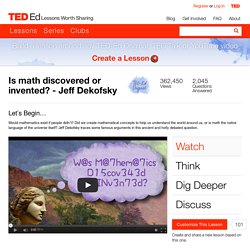
There are varying opinions on the topic. Read this article: How Math Works and get some ideas about the theories that exist on this question. Le recul de la mort - l'immortalité à brève échéance? Laurent Alexandre at TEDxParis 2012. Jeff Iliff: One more reason to get a good night’s sleep. Melissa Fleming: Let’s help refugees thrive, not just survive. Susan Etlinger: What do we do with all this big data? Nancy Kanwisher: A neural portrait of the human mind. À 13 ans il a décidé de quitter l’école. Ecoutez pourquoi, c’est extraordinaire ! Vouloir, c'est pouvoir. Un point, c'est tout. : Mélanie Boissonneault à TEDxSainteMarie. La questiologie ou l'art de poser les bonnes questions: Frederic Falisse at TEDxPantheonSorbonne. Stratégie de la bienveillance: Juliette Tournand at TEDxRennes. Une femme superbe secoue son corps sur scène … Et la foule devient folle!
Maysoon Zayid est une comédienne américaine handicapée.
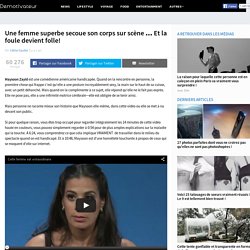
Quand on la rencontre en personne, la première chose qui frappe c'est qu'elle a une posture incroyablement sexy, la main sur le haut de sa cuisse, avec un petit déhanché. Mais quand on la complimente à ce sujet, elle répond qu'elle ne le fait pas exprès. Elle ne pose pas, elle a une infirmité motrice cérébrale—elle est obligée de se tenir ainsi. Mais personne ne raconte mieux son histoire que Maysoon elle-même, dans cette vidéo ou elle se met à nu devant son public.
Si pour quelque raison, vous êtes trop occupé pour regarder intégralement les 14 minutes de cette vidéo haute en couleurs, vous pouvez simplement regarder à 0:54 pour de plus amples explications sur la maladie qui la touche. George Dyson: The birth of the computer. Hans Rosling: Insights on HIV, in stunning data visuals. Ils L'ont Appelée "La Femme La Plus Laide Du Monde" Mais Ce Qu'elle A Répondu A Bluffé TOUT LE MONDE.
Cette femme est admirable. C’est une très belle leçon de vie. Lizzie Velasquez est née avec une maladie très rare que seule une autre personne dans le monde a. Cette maladie est si rare qu’il n’y a aucune explication quant à ce que c’est, en dehors du fait que la personne ne pourra jamais prendre de poids. Geek &Social TEDx Dijon : Wonder woman et les médias sociaux. Susan Colantuono: The career advice you probably didn’t get. Eman Mohammed: The courage to tell a hidden story. Matthieu Ricard: The habits of happiness. Where do genes come from? - Carl Zimmer. Want to learn more about mutations and how essential they are to evolution? The site has all the science you need to get a great background in this topic!
Andy Puddicombe: All it takes is 10 mindful minutes. TEDx: l'innovation est en marche à Martigny - Martigny. 11.09.2014, 16:24 - Martigny Actualisé le 11.09.14, 16:30. Global 2014: The full lineup revealed. TEDGlobal 2014 is themed “South! ,” and it will be the first official TED conference held in South America. Focusing on themes emerging around the world, this conference will take a bold look at the ideas flowing from the Global South, discussing innovation as well as social and political issues, art as well as education, resources as well as technology. TEDGlobal 2014 will take place in Rio de Janeiro, Brazil, from October 6-10. Below, check out the full speaker line-up, organized by discipline. To see the speakers in the order in which they will appear onstage, check out our online program guide. Daniel Goleman: Why aren't we more compassionate? Angela Lee Duckworth: The key to success? Grit.
How sugar affects the brain - Nicole Avena. Dr. Avena’s website has links to new research and articles about the effects of sugar on the brain and behavior, and how this can influence body weight.Want to learn more about the adverse effects of sugar? Read Food Junkie, Dr. Avena’s blog on Psychology Today. Beautiful and sad GIFs that show what’s happening to the ocean.
Scientist Sylvia Earle (TED Talk: My wish: Protect our oceans) has spent the past five decades exploring the seas. During that time, she’s witnessed a steep decline in ocean wildlife numbers — and a sharp incline in the number of ocean deadzones and oil drilling sites. An original documentary about Earle’s life and work premieres today on Netflix. Watch it here. Below, four ocean infographic gifs from the film. What happened to the coral reefs? Between 1950 and 2014, half of the coral reefs across the oceans died. What happened to tuna, sharks, and cod? What to do when your government collapses. Last week, forty Syrians took the risk of leaving their homes and crossing the border into Turkey.
Unlike many who cross, though, these Syrians planned to return. Their goal in Turkey: an intensive week-long workshop on how to rebuild their society. Leaders in their communities, they came from Aleppo, Damascus, Idlib, Homs, Hama and Dara’a to talk with a group of conflict-resolution experts in Istanbul, including me, about the toughest leadership challenge of our time — helping people not only survive day to day in the midst of civil war but create a vision for the future in the face of government collapse and unbelievable human suffering. Syria’s population before the civil war was about 18 million. Today, more than 8 million people have been displaced within Syria or are refugees outside the country.
For those who cannot flee, town committees strive to fill the gaps in social services. Carl Honoré: In praise of slowness. Why we need brave journalists. Clint Smith: The danger of silence. Dr. Martin Luther King, Jr. ,in a 1968 speech where he reflects upon the Civil Rights Movement,states, "In the end,we will remember not the words of our enemiesbut the silence of our friends. " As a teacher, I've internalized this message.Every day, all around us,we see the consequences of silencemanifest themselves in the form of discrimination,violence, genocide and war.In the classroom, I challenge my studentsto explore the silences in their own livesthrough poetry.We work together to fill those spaces,to recognize them, to name them,to understand that they don't have to be sources of shame.In an effort to create a culture within my classroomwhere students feel safe sharing the intimaciesof their own silences,I have four core principles posted on the boardthat sits in the front of my class,which every student signs at the beginning of the year:read critically, write consciously,speak clearly, tell your truth.
Thank you. Remembering Robin Williams. Robin Williams hijacks the TED2008 stage before the BBC World Debate. Richard Turere: My invention that made peace with lions. Surprisingly viral TED Talks. Keren Elazari: Hackers: the Internet's immune system. What does inequality do to our bodies? To our minds? 6 thinkers whose depressing ideas will make you feel better. Video: Can we end pandemics in our lifetime? By tracking social media, it turns out, we can get much better at recognizing pandemics early.
12 Must-See TED Talks for Purposeful Women - Let Why Lead. When my husband first started cueing TED talks for us, I’d try to convince him to go for Modern Family instead. Rory Sutherland: Sweat the small stuff. Just How Small Is an Atom? - Jonathan Bergmann. Mindfulness - force et vulnérabilité: Dominique Steiler at TEDxIsereRiver. David Steindl-Rast: Want to be happy? Be grateful. Deb Roy: La naissance d'un mot. Indispensables. Hans Rosling: Debunking third-world myths with the best stats you've ever seen. What makes tattoos permanent? - Claudia Aguirre.
Further reading to recap what we learned. Urban legend has it that tattooed patients undergoing Magnetic Resonance Imaging (MRI) have experienced the ink being ripped from their skin – Is it true? Even though the presence of metal is common in pigments, there are no documented reports of tattoos being “ripped out” during a routine MRI. But some people do exhibit swelling, itching or burning after getting scanned.
There are also reports of pigments causing problems with the MRI results, perhaps because of the metals in the inks (FDA, 2011). While there is no reason to avoid getting an MRI scan, the radiologist or technician should know so appropriate precautions can be taken. Rethink the way we run charities: A useful reading list. The art — and science — of sharing a secret. Renata Salecl: Our unhealthy obsession with choice. How to thrive in a world where change is constant. What you might not know about the Declaration of Independence - Kenneth C. Davis. Chris Domas: The 1s and 0s behind cyber warfare.
Margaret Heffernan: Dare to disagree. Dan Ariely: What makes us feel good about our work? Will Potter: The shocking move to criminalize nonviolent protest. Let’s play Mexican Kitchen Worker. A new view of slavery, via a letter from my great great grandfather. Simon Sinek: How great leaders inspire action. TEDxParis 2011 - Jean-Louis Servan-Schreiber - Les quatre paradoxes de la vitesse. Mieux armer les enfants contre le harcèlement scolaire: Emmanuelle Piquet at TEDxParis. Le pouvoir de la gratitude: Florence Servan Schreiber at TEDxParisSalon 2012.
Plaidoyer pour l'altruisme: Matthieu at TEDxParis. Un bon schéma vaut mieux qu'un long discours: Clarence Thiery at TEDxINSA. L'éducation positive: Claire Blondel at TEDxLyon. Mihaly Csikszentmihalyi: Flow, the secret to happiness. Comment faire du stress votre ami? La clef du succès ? La ténacité. Vous voulez aider quelqu'un ? Taisez-vous et écoutez! Bâtissez une tour, bâtissez une équipe. Isaac Getz : Libérer l'entreprise. Votre langage corporel forge qui vous êtes.
Pourquoi le travail ne se fait pas au travail. Joe Kowan: Comment j'ai vaincu le trac. My philosophy for a happy life: Sam Berns at TEDxMidAtlantic 2013.